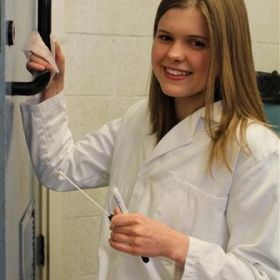Top-flight team in global spotlight
Published on isbi School News dated Tuesday 16th of September 2014
A breakthrough in the battle to beat germs on toilet door handles has been unveiled by a past pupil of Wisbech Grammar School at an international conference in Las Vegas.Holly Young (18), who lives in King's Lynn, has played a pivotal role in a pioneering study aimed at probing ways of cutting down cross-contamination on widely used surfaces that can store up pathogenic bacteria.
The project brought together a team of nine science students at the school all medical and biological science university applicants and critical care consultants from The Queen Elizabeth Hospital, with the school being used as a testing ground for the research.
The talented teenager, who is set to start reading medicine at Newnham College, Cambridge, next month after securing four A* grades in her A Levels in mathematics, biology, chemistry and physics, has presented the findings in the paper produced by the students at the National Environmental Health Association annual educational conference and exhibition at the Cosmopolitan hotel in Las Vegas.
Now their groundbreaking paper, 'Restroom infection control: chlorhexidine, the final frontier', has been accepted for publication by an American publication, the Journal of Environmental Health.
At the conference at the hotel on the Las Vegas strip Holly co-presented the team's findings with her father, Dr Peter Young, a QEH consultant, to a packed audience of environmental health specialists, company representatives and students.
In the study, which was coordinated by Holly, the team members examined the residual antimicrobial effects of the chemical, chlorhexidine, comparing it with a standard, ammonium based product, Tuffie wipes, used for cleaning in hospitals.
The researchers found that both products were equally effective initially, but that door handles treated with chlorhexidine which had previously been used by dentists on patients and in hospitals for cleaning small pieces of human skin remained less contaminated six hours later.
The Queen Elizabeth Hospital agreed to provide £500 of funding for the students' investigation after consultants stumbled across the solution by chance when they were carrying out a laboratory study of the long-term tolerance of their iPads to cleaning products.
Since returning from the States Holly has widened the scope of the research, investigating cleaning electrocardiogram machines, pulse oximeters, blood pressure cuffs and bed rails with the chemical.
She said: 'Conferences are useful because they allow you to share your findings with scientists more quickly than waiting for a paper to be published. It was really exciting to be able to speak to lots of specialists in the environmental health sector.
'The conference also gave me an excellent opportunity to be able to improve my presentational skills and to speak to a big audience.'








